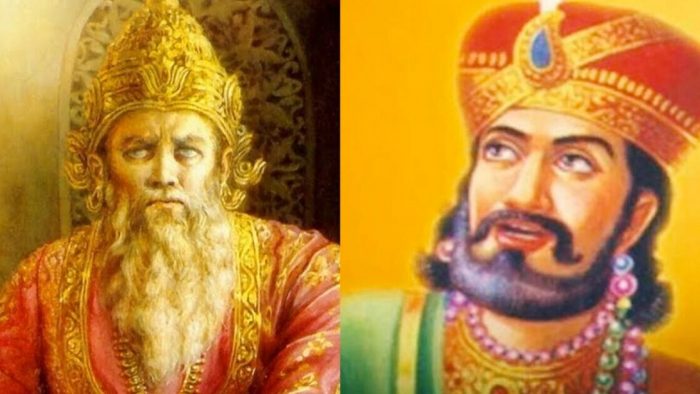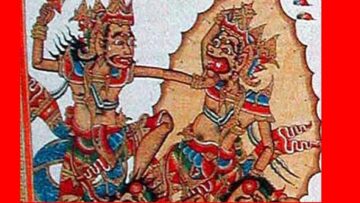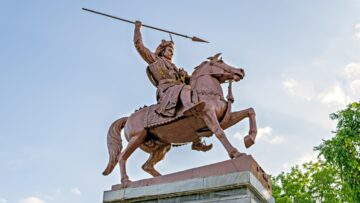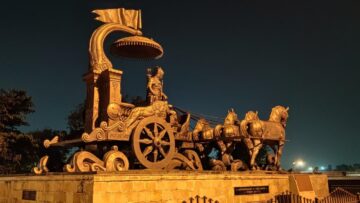A common refrain of Dhritarashtra was to bemoan the vicissitudes of fate, the meaningless of karma, and the supremacy of destiny. It was perhaps his way of not taking responsibility for his actions. In some ways, he was the antithesis of Krishna, who was the ultimate karmayogi.
The seventh chapter of Vidura Niti begins in a similar vein. Dhritarashtra says, “Man is not the master of his destiny. He is like a wooden puppet dangling from a string. The creator has made him subject to destiny.” While Dhritarashtra seemed to be coming around to accepting Vidura’s views, the love for his sons was irreconcilable, in his opinion, with doing what was right for the Pandavas.
विदुरनीतिः 10 – क्षमा आचरणं च बाध्यता च
धृतराष्ट्रः सर्वदा भाग्यस्य चञ्चलतायाः कर्मणः नैरर्थ्यस्य च नियतेः प्रधानता च विषये क्रोशति स्म। स्वकर्मणां दायित्वं न ग्रहितुं एषः तस्य मार्गः स्यात्। किञ्चित् सः भगवतः श्रीकृष्णस्य पूर्णरूपेण विपरीतः। भगवान् तु महान् कर्मयोगी आसीत्। विदुरनीतेः सप्तमः अध्यायः अपि तथैव आरभते। धृतराष्ट्रः वदति, “ मनुष्यः स्वस्य नियतेः स्वामी नास्ति। सः तु तन्तुना अवलम्बितः पुत्रकः इव एव। विधाता तं नियतेः अधीनं कृतवान्।”
यद्यपि धृतराष्ट्रः विदुरस्य वचनं स्वीकर्तुम् इच्छति स्म तदापि यदि पाण्डवैः सह न्यायः क्रियते चेत् स्वपुत्रैः सह अन्यायं भवेत् इति तस्य मतिः आसीत्।
धृतराष्ट्र उवाच
सर्वं त्वमायतीयुक्तं भाषसे प्राज्ञसंमतम्
न चोत्सहे सुतं त्यक्तुं यतो धर्मस्ततो जयः [5.39.7]
Dhritarashtra said, “All that you have said has been approved of by the wise and is for my welfare. But I cannot abandon my son. Where there is dharma, there is victory.”
धृतराष्ट्रः उवाच, “ यत्किमपि त्वया उक्तं तत् मनीषीभिः अपि अनुमोदितं मम कल्याणार्थं च। किन्तु नाहं मम पुत्रान् त्यक्तुं शक्नोमि। यतः धर्मः ततः जयः।”
He says much the same thing towards the end of Vidura Niti – “My inclination has always been to turn towards the Pandavas. But whenever I meet Duryodhana, it turns in a contrary direction. No mortal one is capable of transgressing destiny. I think that destiny is the one who acts and human endeavour is futile.”
विदुरनीतेः अन्ते अपि सः तथैव वदति – “मम प्रवृत्तिः पाण्डवान् प्रति सदैव हितकारिणी आसीत् किन्तु दुर्योधनं मिलित्वा सा सर्वदा विपरीते गता। मानवाः न नियतिम् अतिक्रमितुं शक्नुवन्ति। नियतिः एव कर्त्री मानवानां प्रयत्नः निरर्थकः इति मम मतिः।”
Vidura has a solution for this dilemma also. He suggests to the king that he “Give them a few villages so that they can sustain themselves. … Your sons will be protected through this deed.” This is also the message that Krishna delivers to the king at Hastinapur (Bhagvata Yana parva). Duryodhana had committed an evil act earlier, and it was incumbent on the king to rectify it now.
अस्याः दुविधायाः अपि विदुरः समाधानं ददाति। सः राज्ञे निवेदयति “पाण्डवेभ्यः केचन ग्रामाः दीयन्ताम् यस्मात् पाण्डवाः आत्मनः पालयितुं शक्नुवन्ति……तव पुत्राः अपि एतस्मात् सुरक्षिताः भविष्यन्ति इति।” एतं सन्देशं श्रीकृष्णः अपि हस्तिनापुरे राज्ञे ददाति। (भगवद्-यान पर्व) दुर्योधनः पूर्वं जघन्यकार्यं कृतवान् आसीत् तथा अधुना राज्ञि तस्य कार्यस्य संशोधनकर्तुं दायित्वम् आसीत्।
Vidura advised the king that quarrels with relatives were ill-advised. He said:
विदुरः राजानं मन्त्रयते यत् ज्ञातिभिः सह युद्धं हितकरं नासीत्। सः अवदत् –
ज्ञातयस्तारयन्तीह ज्ञातयो मज्जयन्ति च
सुवृत्तास्तारयन्तीह दुर्वृत्ता मज्जयन्ति च [5.39.23]
“In this world, relatives rescue and relatives make one sink. Those who follow good conduct, rescue. Those who follow evil conduct, make one sink.”
“अस्मिन् लोके ज्ञातयः तारयन्ति ते एव मज्जयन्ति च। ये सदाचारिणः ते तारयन्ति दुराचारिणः मज्जयन्ति च।”
Vidura’s words on humility and good conduct are well worth reproducing:
विनम्रतायाः सदाचारस्य विषये विदुरस्य शब्दाः अपि अत्र प्रकाशनीयाः –
अवृत्तिं विनयो हन्ति हन्त्यनर्थं पराक्रमः
हन्ति नित्यं क्षमा क्रोधमाचारो हन्त्यलक्षणम् [5.39.32]
“Humility destroys bad conduct. Valour destroys adverse circumstances. Forgiveness always destroys anger. Good conduct destroys evil omens.”
“विनयः दुराचारं हन्ति शौर्यं विपरीतपरिस्थितिं हन्ति च क्षमा सर्वदा क्रोधं हन्ति च सदाचारः दुर्निमित्तानि हन्ति च”
After the Pandavas were exiled, Yudhishthira had told Draupadi the greatness of forgiveness, that “Forgiveness is dharma. Forgiveness is sacrifices. Forgiveness is the Vedas. Forgiveness is the sacred texts,” and so on. The shlokas start off as: क्षमा धर्मः क्षमा यज्ञः क्षमा वेदाः क्षमा श्रुतम् [3.3.36a]. Here Vidura adds exquisite nuance to the concept of forgiveness:
पाण्डवानां निर्वासनस्य पश्चात् युधिष्ठिरः द्रौपदीं क्षमायाः महानतायाः विषये अवदत् यत् “ क्षमा धर्मः क्षमा यज्ञः च क्षमा वेदाः च क्षमा श्रुतयः च इत्यादयः” श्लोकः अथ आरभते – “क्षमा धर्मः क्षमा यज्ञः क्षमा वेदाः क्षमा श्रुतम् [3.3.36a]”। अत्र विदुरः क्षमायाः विषये एकां उत्कृष्टां सूक्ष्मतां ददाति –
क्षमेदशक्तः सर्वस्य शक्तिमान्धर्मकारणात् [5.39.46a]
“A weak person must forgive everything. A strong person must do that for the sake of dharma.”
“अशक्तमनुष्यः तु सर्वं क्षमेत् किन्तु शक्तिमान् धर्मकारणात् क्षमेत्”
Of course, the situation was different when Yudhishthira spoke the words, uttered more out of compulsion and a recognition of the predicament facing the Pandavas at the time, so it is important to place those words, and any other from the Mahabharata, in their appropriate context to gain a true appreciation of their import.
किन्तु इदं ज्ञातव्यं यत् यदा युधिष्ठिरः एवम् अवदत् तदा स्थितिः भिन्ना आसीत् , तस्य शब्दाः विपरीतेषु निमित्तेषु उक्ताः आसन्। तेषां शब्दानाम् अर्थम् अथवा महाभारतस्य अन्यानाम् अपि शब्दानाम् अर्थम् अवबोधयितुं उचितः सन्दर्भः ज्ञातव्यः।
This chapter ends with more advice from Vidura on what one should sorrow over, what causes aging, what is the cause of diminishing, and more.
एतस्य अध्यायस्य अन्ते विदुरः उपदिशति किं शोचितव्यम् जरा केन क्रियते च अपह्रासं कथं भवति च इति –
क्रोधेन जयेत्क्रोधमसाधुं साधुना जयेत्
जयेत्कदर्यं दानेन जयेत्सत्येन चानृतम् [5.39.58]
- “Anger should be conquered with lack of anger
- Wickedness should be conquered with goodness
- Miserliness should be conquered with generosity
- Falsehood should be conquered with the truth”
- शान्तस्वभावेन क्रोधः जेतव्यः।
- साधुस्वभावेन दुष्टता जेतव्या।
- उदारतया कृपणत्वं जेतव्यम्।
- सत्येन अनृतं जेतव्यम्।
अविद्यः पुरुषः शोच्यः शोच्यं मिथुनमप्रजम्
निराहाराः प्रजाः शोच्याः शोच्यं राष्ट्रमराजकम् [5.39.62]
- “One should sorrow over a man who is without learning
- One should sorrow over a couple that has no offspring
- One should sorrow over subjects who are hungry
- One should sorrow over a kingdom that has no king”
- यः अज्ञानी निस्सन्तानः च सः शोच्यः।
- ये प्रजाः निराहाराः ते शोचनीयाः।
- राजाहीनं राज्यं शोचनीयम्।
अध्वा जरा देहवतां पर्वतानां जलं जरा
असंभोगो जरा स्त्रीणां वाक्शल्यं मनसो जरा [5.39.63]
- “Those who have bodies age through travels
- Mountains age through rain
- The lack of intercourse ages women
- Harsh words age the mind”
- देहिनः यात्रया जरां गच्छन्ति।
- पर्वताः वृष्ट्या क्षीयन्ते।
- संभोगविना नार्यः जरां गच्छन्ति।
- कटुशब्देन मनः जरां गच्छति।
अनाम्नायमला वेदा ब्राह्मणस्याव्रतं मलम्
कौतूहलमला साध्वी विप्रवासमलाः स्त्रियः[5.39.64]
- “The Vedas are tarnished if they are not recounted
- Brahmanas are tarnished from lack of vows
- Curiosity tarnishes chaste women
- Banishment from home tarnishes women
- जपितव्याः यदि वेदाः मलिनाः भवन्ति।
- ब्राह्मणाः यदि व्रतं न आचरन्ति तर्हि ते मलिनाः भवन्ति।
- कौतुहलेन चरित्रवती नारी मलिना भवति।
- गृहाद् बहिष्कृता नारी मलिना भवति।
सुवर्णस्य मलं रूप्यं रूप्यस्यापि मलं त्रपु
ज्ञेयं त्रपुमलं सीसं सीसस्यापि मलं मलम् [5.39.65]
- Silver tarnishes gold
- Tin tarnishes silver
- Lead tarnishes tin
- Dust tarnishes lead”
- रजतः स्वर्णं दूषयति।
- त्रपु रजतं दूषयति।
- सीसं त्रपुं दूषयति।
- मलं सीसं दूषयति।
न स्वप्नेन जयेन्निद्रां न कामेन स्त्रियं जयेत्
नेन्धनेन जयेदग्निं न पानेन सुरां जयेत् [5.39.66]
- “Do not vanquish sleep with more sleep
- Do not vanquish women through desire
- Do not conquer a fire by kindling it
- Do not conquer thirst through liquor”
- अधिकशयनेन निद्रा न जेतव्या।
- कामनया स्त्री न जेतव्या।
- ईन्धनेन अग्निः न जेतव्यः।
- सुरापानेन पिपासा न जेतव्या।
In closing, Vidura exhorts Dhritarashtra to give up desire, for “Those who have thousands live. Those who have hundreds also live.” (सहस्रिणोऽपि जीवन्ति जीवन्ति शतिनस्तथा – 5.39.68a)
अन्ततः विदुरः धृतराष्ट्रम् इच्छां त्यक्तुं प्रचोदयति यतः “येषां शतवस्तूनि सन्ति ते अपि जीवन्ति येषां सहस्रवस्तूनि सन्ति ते अपि जीवन्ति। “
Vidura continues in the next chapter, telling the king that “Hope destroys steadfastness. Death destroys prosperity. Anger destroys riches. Miserliness destroys fame. Failure to tend destroys animals. O king! Even one single angry brahmana destroys a kingdom.”
आशा धृतिं हन्ति समृद्धिमन्तकः; क्रोधः श्रियं हन्ति यशः कदर्यता
अपालनं हन्ति पशूंश्च राज;न्नेकः क्रुद्धो ब्राह्मणो हन्ति राष्ट्रम् – 5.40.7
अग्रिमे अध्याये पुनः विदुरः राज्ञे निवेदयति यत् “आशा धृतिं नाशयति मृत्युः समृद्धिं प्रणश्यति च क्रोधः धनं प्रणश्यति च कार्पण्यं ख्यातिं प्रणश्यति च पशूनां पालनं न कुर्यात् चेत् ते विनश्यन्ते। हे राजन् एकः अपि क्रुद्धः ब्राह्मणः राष्ट्रं प्रणश्यति। “
Vidura says that the objective of his advising the king was for him to be content and to give up the transient. The body was transient, and only a person’s deeds followed him, just as relatives and well-wishers returned after casting a dead person’s body into the fire, it was the dead person’s deeds that followed him.
राजानं मन्त्रयितुं तस्य उद्देशः कः इति वदति विदुरः। राजा सन्तोषी भवेत् क्षणिकं त्यजेत् च। शरीरः क्षणिकः केवलं मनुष्यस्य कृत्यानि तम् अनुसरन्ति। यथा मनुष्यानां सुहृदाः बान्धवाः च अन्त्येष्ट्यान्तरे पुनः निवर्तन्ति केवलं मानवानां कृत्यानि तान् अनुसरन्ति।
Here, Vidura invokes vivid imagery to present a picture of the soul, deeds, and more, and which is worth reproducing in full:
अत्र शब्दैः यत् चित्रं विदुरः उल्लिखति तत् अत्र प्रस्तुतव्यम् –
आत्मा नदी भारत पुण्यतीर्था; सत्योदका धृतिकूला दमोर्मिः
तस्यां स्नातः पूयते पुण्यकर्मा; पुण्यो ह्यात्मा नित्यमम्भोऽम्भ एव [5.40.19]
The soul is a river. Purity represents its tirthas. Truthfulness is its water. Steadfastness constitutes the banks. Self-control represents the waves. Bathing in these, a performer of pure deeds purifies himself. The soul becomes pure and is like water in the eternal waters.
आत्मा नदी इव अस्ति। पवित्रता तस्याः तीर्थः। सत्यता तस्याः जलम्। धृतिः तस्याः कूलद्वया। आत्मसंयमः तस्याः उर्मिः। आत्मारूपीनद्यां स्नानेन पुण्यकर्मकर्तारः पवित्राः भवन्ति। आत्मा पुण्यः भवति तथा नित्यजलेषु जलमिव भवति।
and
तथा च
कामक्रोधग्राहवतीं पञ्चेन्द्रियजलां नदीम्
कृत्वा धृतिमयीं नावं जन्मदुर्गाणि संतर [5.40.20]
There is a river in which the five senses are the water and desire and anger are the crocodiles. Make a boat out of steadfastness and cross the difficult eddies of repeated birth.
एका नदी यस्मिन् पञ्चेन्द्रियाः कामः च क्रोधः च ग्राहाः इव। धृत्या नौकां निर्माय जन्ममरणस्य आवर्तिनी तर्तव्या।
Dhritarashtra began the seventh chapter with a lament about the primacy of destiny. He ends the eighth chapter with another lament – “I think that destiny is the one who acts and human endeavour is futile.”
धृतराष्ट्रः सप्तमस्य अध्यायस्य आदौ नियतेः प्रधानतायाः विषये क्रोशति। सः अष्टमस्य अध्यायस्य अन्ते अपि पुनः क्रोशति – “ अहं चिन्तयामि नियतिः एव कर्त्री मानवानां कर्माणि निरर्थकानि। “
In the last chapter of Vidura Niti, Dhritarashtra asks Vidura whether there was anything he had not yet spoken about. Vidura answered that the sage Sanatsujata was the one who could speak with the king. The sage manifested himself and Vidura requested the sage to clarify the king’s doubts.
विदुनीतेः अन्ते धृतराष्ट्रः विदुरं पृच्छति यदि विदुरेण अनुक्तं किमपि शेषम् इति। तदा विदुरः उत्तरति यत् ऋषिः सनत्सुजातः राज्ञा सह जल्पिष्यति। ऋषिः प्रकटीभवति । विदुरः तम् राज्ञः संशयं निवारयितुम् अनुरोधयति।
This ends Prajagara Parva, which contains Vidura Niti.
अथ समाप्यते प्रजागरपर्व यस्मिन् विदुरनीतिः अस्ति।
Reference
Translated excerpts from Bibek Debroy’s unabridged, ten-volume, English translation of the Bhandarkar Oriental Research Institute’s Critical Edition of the Mahabharata, published by Penguin from 2010 to 2015. The translations here are from volume 4. The Sanskrit verses are John Smith’s revision of Prof. Muneo Tokunaga’s version of the text, and available online at https://bombay.indology.info/
Disclaimer: Views expressed are personal
Sanskrit Translation by @Pvaal, @Patangah from Twitter.
Explore Tales from the Mahabharata: Vidura Niti Part I, II, III, IV, V, VI, VII, VIII, and IX
Disclaimer: The opinions expressed in this article belong to the author. Indic Today is neither responsible nor liable for the accuracy, completeness, suitability, or validity of any information in the article.











